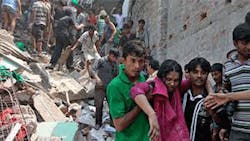New Safety Plan for Bangladesh Factories Set by Retailers
WASHINGTON --- Seventeen leading U.S .and Canadian clothing retailers announced on Wednesday a program to enforce safer conditions for workers in Bangladesh garment plants, after the collapse of a factory building killed more than 1,100.
The retailers, led by Walmart and Gap, called the safety record of Bangladesh factories "unacceptable" and said that all parties involved in the country's huge garment export industry needed to be accountable, including factory owners and the government as well as buyers.
The 17 established a five year program, the Bangladesh Worker Safety Initiative, to set "aggressive timelines and accountability" for inspections, worker training and worker empowerment, they said in a statement.
"The safety record of Bangladeshi factories is unacceptable and requires our collective effort. We can prevent future tragedies by consolidating and amplifying our individual efforts to bring about real and sustained progress," they said in a statement.
"A primary goal of the alliance is the engagement of and partnership with the Bangladeshi and U.S. governments, as well as with the factory owners to ensure that there is accountability among all parties and thus the opportunity for sustained and lasting change in Bangladesh."
The deal followed a similar commitment by 70 mainly European retailers to boost safety in Bangladesh plants, which have a long record of worker deaths from fires and other dangerous conditions.
In April, a nine story building housing several factories that supplied some of the world's biggest names in fashion collapsed, killing 1,129 people in one of the world's worst industrial disasters.
The Rana Plaza collapse increased pressure on the world's largest clothing retailers, like Inditex, H&M, Primark, Gap and Walmart, and threatened to damage Bangladesh's $20 billion garment export industry, second in size only to China.
In late June, the United States said it would remove preferential trade status from Bangladesh to press the government to enforce worker safety.
The new alliance pledged to inspect all its supplier factories within one year, and members agreed to refuse to source products from plants that are determined unsafe.
They plan to share inspection results through a "Fair Factories Clearinghouse", with findings available to factory owners, workers and the government.
In addition, the group pledged to enforce mandatory training and education for factory staff and management, and that all factories serving the alliance will have to have democratically elected Worker Participation Committees.
The retailers also agreed to set up an anonymous worker hotline, administered by a third party, to enable workers to report safety problems without fear of retribution.
"All workers, no matter where they live, have the right to a safe environment. Partnership and collaboration are critical to making sure that happens," Walmart, the world's single largest retailer, said in a separate statement.
"We believe companies and government have a responsibility to ensure that tragedies like those in Bangladesh do not happen again, and that we really can work together to empower government and private parties to act on dangerous safety conditions."
-Paul Handley, AFP
Copyright Agence France-Presse, 2013
About the Author
Agence France-Presse
Copyright Agence France-Presse, 2002-2025. AFP text, photos, graphics and logos shall not be reproduced, published, broadcast, rewritten for broadcast or publication or redistributed directly or indirectly in any medium. AFP shall not be held liable for any delays, inaccuracies, errors or omissions in any AFP content, or for any actions taken in consequence.
